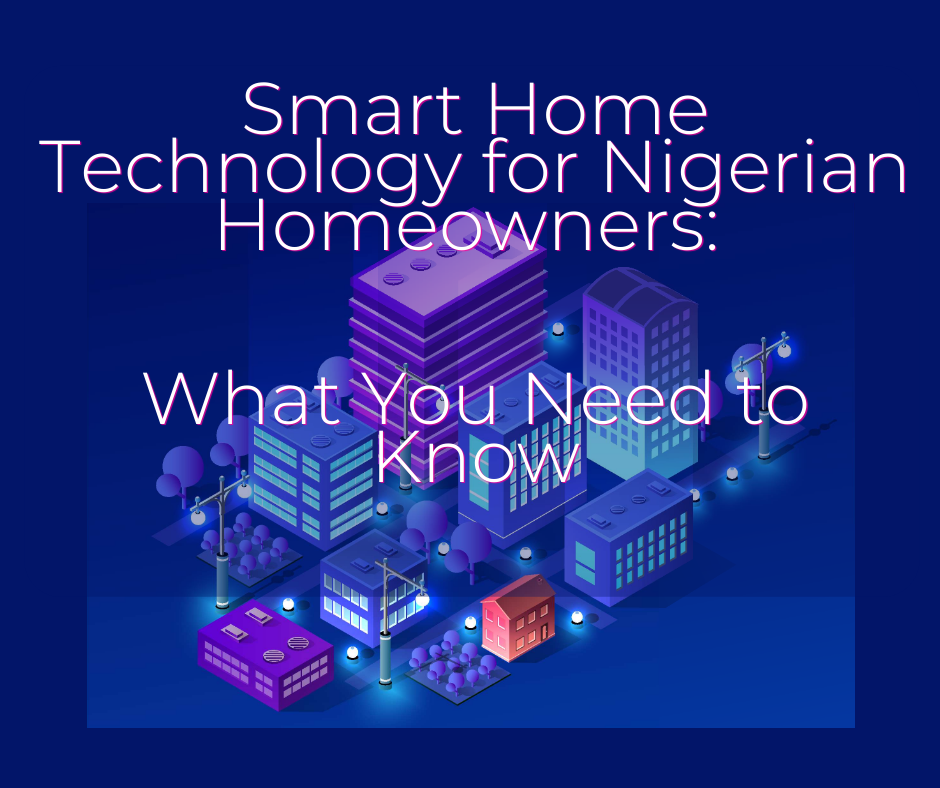Real Estate in Nigeria
Smart Home Technology for Nigerian Homeowners: What You Need to Know
Introduction:
Smart home technology has revolutionized the way we interact with our living spaces, providing increased convenience, security, and energy efficiency. In Nigeria, where technological advancements are rapidly evolving, adopting smart home solutions can enhance the quality of life for homeowners. In this blog post, we will delve into the world of smart home technology and explore how Nigerian homeowners can benefit from automation, security systems, energy efficiency, and enhanced convenience.
Home Automation:
Home automation allows homeowners to control various devices and systems within their homes using smartphones or voice commands. With automation, you can remotely control lighting, temperature, security systems, and even appliances. For example, you can schedule lights to turn on and off automatically, adjust the thermostat while away from home, or receive notifications when someone approaches your property. Home automation provides convenience and peace of mind, allowing Nigerian homeowners to manage their homes efficiently and securely.
Enhanced Security Systems:
Smart home technology offers advanced security features to protect your property and loved ones. Integrated security systems can include surveillance cameras, smart locks, doorbell cameras, and motion sensors. These devices provide real-time monitoring, allowing homeowners to remotely view their property and receive instant notifications in case of any suspicious activities. Enhanced security systems offer a sense of safety and peace of mind, which is particularly valuable in Nigeria’s urban areas.
Energy Efficiency:
Smart home technology plays a crucial role in promoting energy efficiency and reducing utility bills. Smart thermostats allow homeowners to regulate the temperature of their homes remotely and create energy-saving schedules. Lighting systems can be programmed to automatically turn off when not in use or adjust brightness based on natural light levels. Smart power outlets and energy monitoring devices help track energy consumption and identify areas for improvement. By utilizing these energy-saving features, Nigerian homeowners can contribute to a sustainable future while enjoying cost savings.
Voice-Activated Assistants:
Voice-activated assistants, such as Amazon Alexa or Google Assistant, have become popular additions to smart homes. These virtual assistants can perform various tasks, such as playing music, providing weather updates, answering questions, and even controlling smart devices. Nigerian homeowners can use voice-activated assistants to control their smart home systems through simple voice commands, making daily tasks more convenient and hands-free.
Entertainment and Media Control:
Smart home technology extends beyond security and energy efficiency. Homeowners can integrate entertainment systems, such as TVs, audio systems, and streaming devices, into their smart home ecosystems. With a single app or voice command, you can control your entire entertainment setup, adjusting volume, selecting music or movies, and even syncing different devices. This seamless control enhances the overall entertainment experience and adds a touch of luxury to Nigerian homes.
Conclusion:
Smart home technology offers Nigerian homeowners a wide range of benefits, including automation, enhanced security systems, energy efficiency, and convenient control over various devices and systems. By embracing smart home solutions, homeowners can enjoy the convenience of automation, the peace of mind offered by advanced security systems, the cost savings of energy efficiency, and the luxury of controlling their entertainment setups effortlessly. As technology continues to advance, smart homes will play an increasingly significant role in enhancing the quality of life for Nigerian homeowners.

